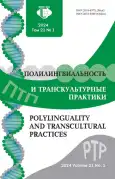Ahmadu Kuruma’s Novel Allah n’est pas oblige - As an Example of a Polylingual Text
- Autores: Traore Y.1
-
Afiliações:
- State University of Education
- Edição: Volume 21, Nº 1 (2024)
- Páginas: 154-163
- Seção: LITERARY SPACE
- URL: https://journal-vniispk.ru/2618-897X/article/view/326953
- DOI: https://doi.org/10.22363/2618-897X-2024-21-1-154-163
- EDN: https://elibrary.ru/DPFUNK
- ID: 326953
Citar
Texto integral
Resumo
Writing in the ethnic languages of Africa arose relatively recently on a historical scale, so local writers used the languages of the colonialists in their works of fiction. However, some of them did not completely break with the languages of their localities, capturing in their works the linguistic diversity characteristic of the living environment. The material of our research is the novel Allah n’est pas obligé (Allah is not obligated) by the Ivorian writer Ahmadou Kuruma, published in 2000. The literary work is considered as an example of multilingual artistic creation - French as the official language of Ivory Coast, Malinke as the author's native language and Liberian English (pidgin, originated in the territories of Liberia and Sierra Leone), common in this region. The article describes the linguistic ways of expressing the oral tradition of African storytellers, although the content of Kuruma’s work touches on topics relevant to modern Africa (the use of proverbs, repeated repetitions, literal translation of words and expressions from other languages). The main method of research is the linguistic analysis of the text. It is shown that multilingualism and the use of traditional storytelling techniques are key characteristics of the writer’s work, which contributes to the popularity of his works on the African continent.
Palavras-chave
Sobre autores
Yaya Traore
State University of Education
Autor responsável pela correspondência
Email: ya2.tra@gmail.com
ORCID ID: 0009-0006-2592-2652
postgraduate student of the Department of Language Theory, English Studies and Applied Linguistics
24 Very Voloshinoy St, Mytishchi, Moscow Region, 141014, Russian FederationBibliografia
- Kytina, V.V. and N.V. Ryzhova. 2017. The Phenomenon of Multilingualism in a Limited Language Environment. RUDN Journal of Language Education and Translingual Practices, vol. 14, no. 4, pp. 611–620. https://doi.org.10.22363/2312-8011-2017-14-4-611-620
- Valuitseva, I.I., and G.T. Khukhuni. 2015. Literary Bilingualism: pro and contra. Polylinguality and transcultural practices, no. 5, pp. 298–303.
- Bakhtikireeva, U.М., and О.А. Valikova. 2022. “Language Keys”: Foreign Cultural Lexicon in the Translingual (Russophonic) Literary Text, RUDN Journal of language studies, semiotics and semantics, 2022, 13(1), 184–200, https://doi.org.10.22363/2313-2299-2022-13-1-184-200
- Ausoni, A. 2013. Écriture translingue et autobiographie [Translingual writing and autobiography], Oxford: Peter Lang, pp. 63–85.
- Weissmann, D. 2018. Monolinguisme, plurilinguisme et translinguisme chez Paul Celan [Paul Celan’s monolingualism, plurilingualism and translingualism], Genesis, 46, Avaliable from: http://journals.openedition.org/genesis/2606, https://doi.org/10.4000/genesis.2606
- Dezortseva, M.A. 2018. Polylinguism in the Historical Novel «Wolf Hall»by Hilary Mantel, South Ural State Humanitarian Pedagogical University, no. 2, pp. 147–151. https://doi.org.10. 29025/2079–6021-2018-2(30)-147-151
- Bakhtikireeva U., Valikova O., and J. King. 2017. Translingualism: Communicative Bridge or “Cultural Bomb”? RUDN Journal of Language Education and Translingual Practices, vol. 14, no. 1, pp. 116–121. https://doi.org.10.22363/2312-8011-2017-14-1-116-121
- Muotoo, C.H., Anukwu, A.U., and A. Nwaukoni. 2021. L’instabilité politique et la crise économique dans les œuvres d’Ahmadou Kourouma [Political Instability and Economic Crisis in the Works of Ahmadou Kourouma], Interdisciplinary Journal of African & Asian Studies, vol. 7, no. 1, pp. 84–92.
- Kesteloot, L. 2012.La littérature négro-africaine face à l’histoire de l’Afrique [Negro-African Literature and the History of Africa]. Afrique Contemporaine, no. 1, pp. 43–53. https://doi.org. 10.3917/afco.241.0043.
- Waberi, A.A. 1998. Les enfants de la postcolonie: esquisse d’une nouvelle génération d’écrivains francophones d’Afrique noire [Children of the Postcolony: sketching a new generation of francophone writers from black Africa]. NOTRE LIBRAIRIE, no. 135, pp. 8–15.
- Naydenova, N.S. 2012. The Formation and Establishment of African Literature in French. Russian Journal of Linguistics, no. 2, pp. 51–56.
- Khalikov, M.M. 2021. Multilingualism of F.M. Dostoevsky’s Artistic World, Izvestiya of the Samara Science Centre of the Russian Academy of Sciences. Social, Humanities, Biomedical Sciences. https://cyberleninka.ru/article/n/polilingvizm-hudozhestvennogo-miraf-m-dostoevskogo (accessed: 05.11.2023), no. 23, pp. 98–109. https://doi.org.10.37313/24139645-2021-23-76-98-109
- Mufutau, A.T. 2004. Ahmadou Kourouma, un conteur traditionnel sous la peau du romancier [Ahmadou Kourouma, a traditional storyteller in the skin of a novelist], SEMEN, http://journals.openedition.org/semen/1220. https://doi.org.10.32997/pa-2022-3832 (accessed: 20.09.2023).
- Kourouma, A. 1968. Les Soleils des indépendances [The Suns of Independence], Les presses De l’universite De Montreal, Montréal.
- Kourouma, A. 2000. Allah n’est pas obligé [Allah is not obliged], Editions du seuil, Paris, https://doi.org.10.3917/polaf.080.0079
- Derive, J. 2004. Imitation et transgression. De quelques relations entre la littérature orale et la littérature écrite dans les cultures occidentales et africaines [Imitation and transgression. Some relationships between oral and written literature in Western and African cultures], Cahiers de Litterature Orale, no. 56, 22 p. https://shs.hal.science/halshs-00344011
- Ndiaye, C. 2004. Introduction aux littératures francophones: Afrique Caraïbe Maghreb [Introduction to French literature: Africa Caribbean Maghreb], Presses de l’universite de montreal. http://books.openedition.org/pum/10652>. ISBN: 9791036502477.
- Adjil, B. 1995. Négritudes. Les écrivains d’Afrique noire et la langue française [Black African writers and the French language], Cahiers d’etudes africaines [Online], no. 35, pp. 934–935. https://www.persee.fr/doc/cea_0008-0055_1995_num_35_140_1891_t1_0934_0000_2) (accessed: 18.09.2023).
Arquivos suplementares









